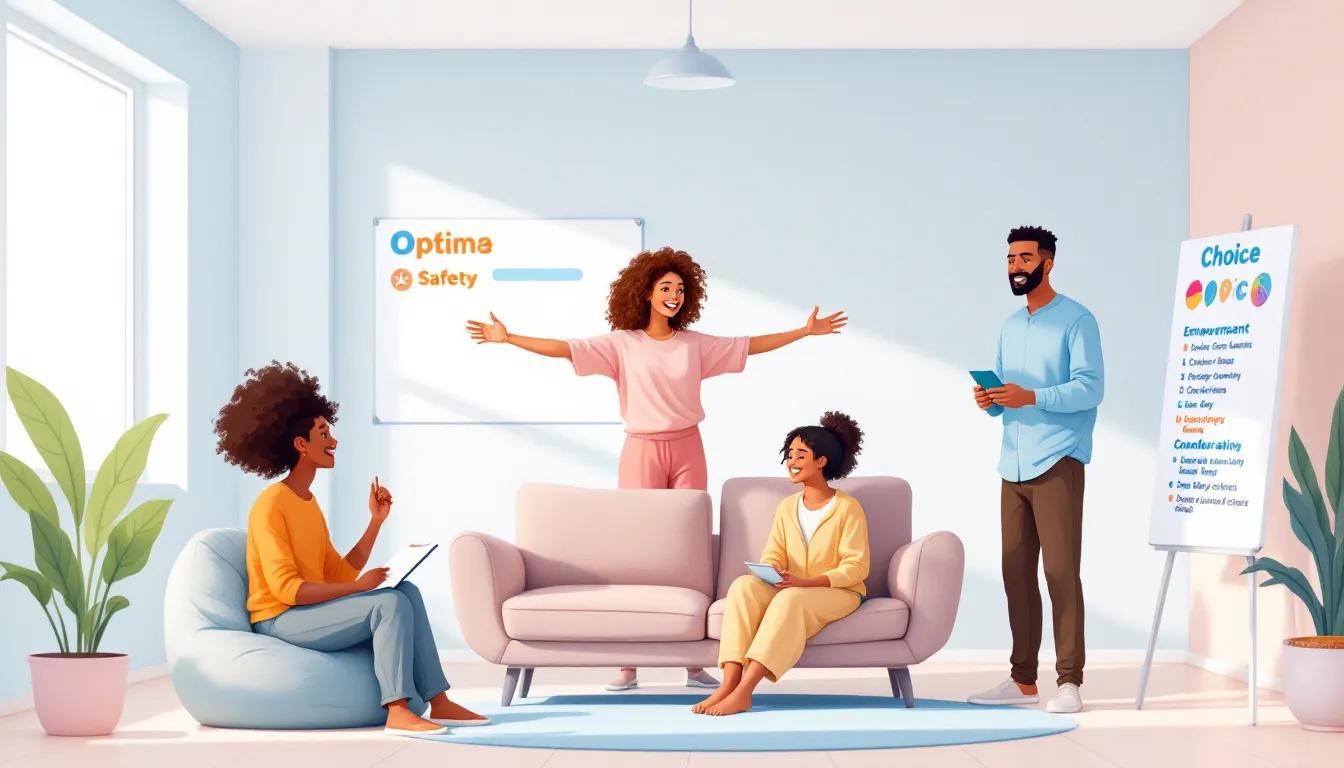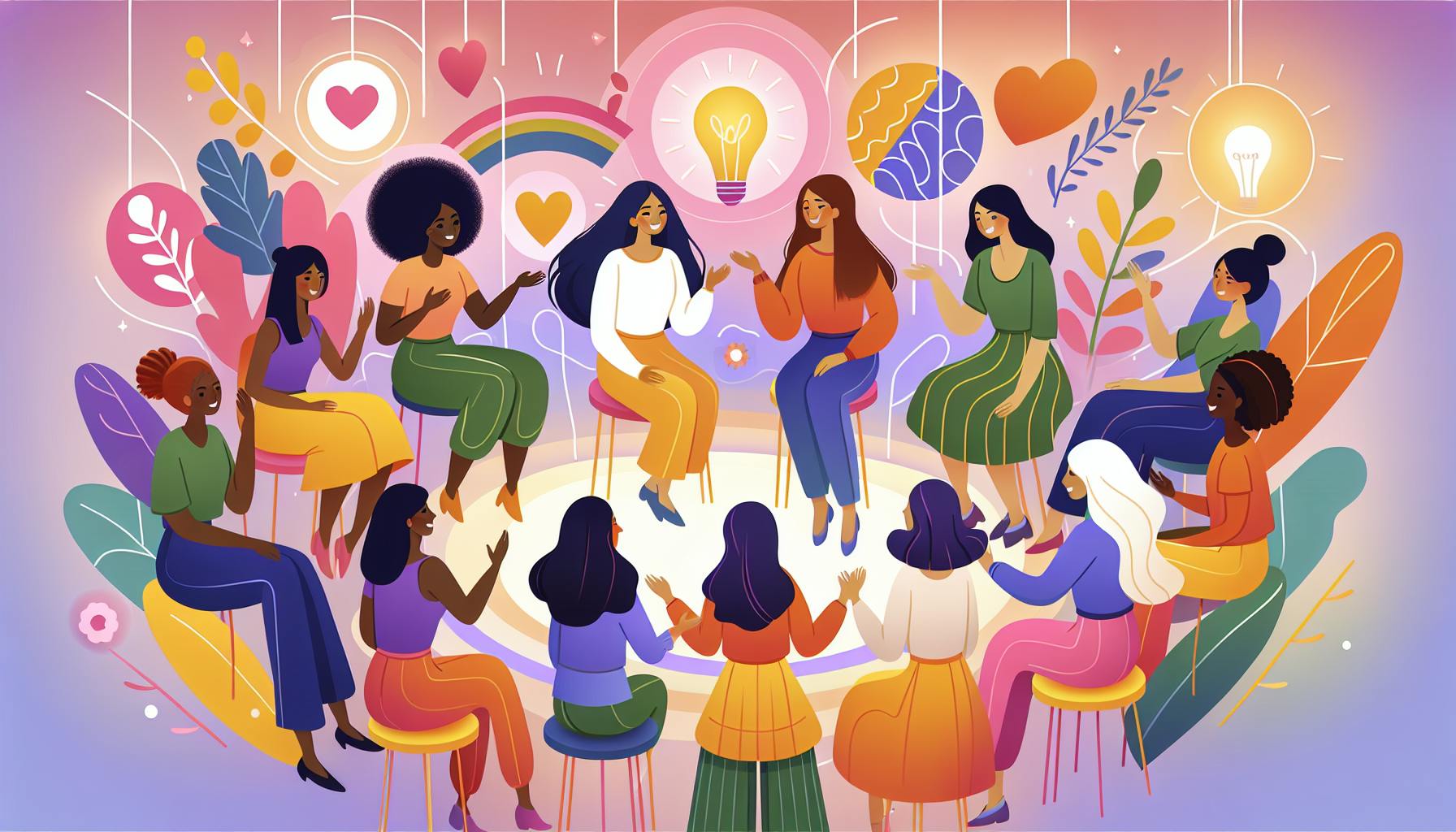Looking for help with postpartum depression (PPD)? Here's a quick guide to the 5 most effective therapy types that can help you feel better:
| Therapy | Best For | How Long to See Results |
|---|---|---|
| CBT | Changing negative thoughts | 6-8 weeks |
| IPT | Relationship struggles | 12-16 weeks |
| Mindfulness | Anxiety and racing thoughts | 8-10 weeks |
| DBT | Managing intense emotions | 12-24 weeks |
| Group Therapy | Feeling isolated | 8-12 weeks |
Quick Facts About PPD:
- Affects 1 in 7 new parents in their first year
- Shows up as intense sadness, isolation, and mood swings
- Can hit ANY parent (birth parents, partners, adoptive parents)
- Therapy works better than medication as first treatment
What You Need to Know:
| Treatment Details | What to Expect |
|---|---|
| Cost | $100-200 per session |
| Format | In-person or online |
| Insurance | Often covered |
| Success Rate | 80% improve with treatment |
Here's the bottom line: PPD is super common, but you don't have to tough it out alone. Each therapy type brings something different to the table - from fixing thought patterns to building better relationships. The key? Getting help early makes a huge difference.
Want the full scoop on each therapy type? Keep reading to find the perfect fit for you.
Related video from YouTube
CBT: Understanding Your Thoughts and Actions
CBT helps you spot and change negative thoughts that make PPD worse. Here's what happens during CBT:
| What Happens in CBT | How It Helps |
|---|---|
| Spot negative thoughts | Catch yourself thinking "I'm a bad parent" |
| Question these thoughts | Find more balanced ways to see situations |
| Build coping tools | Get better at handling stress |
| Create action plans | Take small steps toward feeling better |
| Check your progress | See how your mood changes over time |
Most people do CBT for about 12 sessions. Each session builds on what you learned before.
"CBT interventions resulted in significant reductions in depressive symptoms compared to control conditions in both treatment and prevention studies." - Laura E. Sockol, Researcher
Here's What Research Shows:
- Studies of 956 women prove CBT reduces PPD symptoms
- People often feel better in a few months
- It works both face-to-face and online
What Sets CBT Apart:
- Focuses on quick results
- Gives you tools you can use now
- Works by itself or with medicine
- Comes in different formats (solo, group, online)
Charlie Health offers online CBT through their Intensive Outpatient Program. You get personal counseling plus family and group sessions.
Pick Your CBT Therapist By:
- Their PPD background
- Online session options
- Time and schedule details
- Insurance coverage
Don't wait to start CBT if you notice PPD signs. Early help from your doctor can stop symptoms from getting worse.
2. IPT: Improving Your Relationships
IPT targets relationship problems that make postpartum depression worse. Here's what you need to know:
| Focus Area | What It Does |
|---|---|
| Role Changes | Helps you handle the switch to parenthood |
| Relationship Issues | Fixes problems with your partner or family |
| Support Network | Shows you how to build better connections |
| Communication | Teaches clear ways to say what you need |
The Basics of IPT:
| Treatment Details | What to Expect |
|---|---|
| Length | 12 weeks |
| Format | Private or group sessions |
| Partner Sessions | 2+ sessions with your partner |
| Recovery Rate | 37.5% get better (vs 13.7% without IPT) |
Here's something cool: A study of 120 women showed that IPT cut depression scores from 19.4 to 8.3. Without IPT? Scores only dropped from 19.8 to 16.8.
"IPT attempts to improve attachment security, interpersonal change, and psychological distress." - Scott Stuart, Expert in Interpersonal Psychotherapy
What Changes With IPT:
| Area | What Gets Better |
|---|---|
| Depression | Symptoms drop by half or more |
| Social Skills | You'll handle tough talks better |
| Partner Support | Your relationship gets stronger |
| Parenting | You connect better with your baby |
IPT might be right for you if:
- You feel cut off from others
- You're having partner problems
- You need more people in your corner
- You want treatment without meds while breastfeeding
The cool thing? IPT works everywhere. Studies from Zambia, Kenya, Pakistan, and Iran show women in IPT groups did WAY better than those getting regular care.
How It Works:
| Phase | What You Do |
|---|---|
| Start | Look at who's in your life |
| Middle | Pick up new communication skills |
| End | Use what you learned every day |
Most insurance plans cover IPT, and you can do it online or face-to-face. It's a practical way to fix relationship issues while beating depression.
3. Mindfulness Therapy: Being Present
Let's talk about how mindfulness therapy helps moms stay focused on the present moment instead of spiraling into worry. Here's what the data shows:
| Research Results | Numbers |
|---|---|
| Women with depression who got better | 81.6% |
| Women without mindfulness who got worse | 50.2% |
| Moms with depression during pregnancy/after birth | 15% |
Simple Daily Actions
| Action | What To Do |
|---|---|
| Morning Start | 3 deep breaths + pick one goal |
| Baby Time | Sync your breath with your baby |
| Quick Pauses | Focus on water in shower, taste of food |
| Stroller Time | Notice each footstep as you walk |
| Night Notes | List 2-3 good moments |
"Parenting shows us the best and worst of ourselves and stretches us beyond where we thought we could go." - Katy Cribbs, Author at Thrive Global
Core Skills You'll Build:
| Skill | Benefit |
|---|---|
| Breath Work | Drops stress levels fast |
| Body Scan | Catches tension before it builds |
| Thought Check | Stops negative thought loops |
| Mood Watch | Better emotional control |
The S.T.O.P Method breaks it down:
| Step | What To Do |
|---|---|
| Stop | Hit pause |
| Take a breath | Breathe deep into belly |
| Observe | Notice thoughts/feelings |
| Proceed | Move forward mindfully |
"Practicing mindfulness allowed me to ask for help." - Gaby Merediz, mother and owner of Make Your Perfect
Tools That Get Results:
| Tool | How To Use It |
|---|---|
| Worry Log | Dump your fears on paper |
| Good Things List | Write 3 daily wins |
| Mini-Breaks | 2-min breathing stops |
| Thought Flip | Switch negative to neutral |
The proof? Studies show pregnant women who practice mindfulness have less anxiety and depression than those who don't. These benefits stick around after baby arrives.
Try Mindfulness If:
- You want a natural mood boost
- You're looking for non-medical options
- You need quick calm-down tricks
- New mom life feels too much
Start tiny - even 5 minutes counts. Try it during feedings or when baby naps.
sbb-itb-3d00657
4. DBT: Managing Strong Emotions
DBT gives new moms practical tools to handle intense feelings after having a baby. Here's what you'll get:
| Core DBT Skills | What You'll Learn |
|---|---|
| Emotion Control | Stop feelings from taking over |
| Stress Handling | Navigate hard moments without making them bigger |
| Better Relations | Connect better with family and friends |
| Stay Present | Focus on the now with mindfulness |
How It Works in Real Life:
| Skill Type | Daily Use |
|---|---|
| Crisis Skills | Quick fixes when your baby won't stop crying |
| Emotion Skills | Notice what sets off tough feelings |
| People Skills | Get support without feeling bad |
| Self-Care Skills | Put yourself first sometimes |
What DBT Looks Like:
| Session Type | Purpose |
|---|---|
| One-on-One | Personal coaching for your needs |
| Group Skills | Learn from other moms |
| Phone Support | Help when you need it most |
| Practice Work | Use skills at home |
"DBT gives people tools to handle emotions like feeling hopeless, guilty, worried, scared, or mad." - Marsha Linehan, DBT Creator
Time You'll Spend:
| Length | What Happens |
|---|---|
| 6 Months | Get the basics down |
| 12 Months | Build advanced skills |
| Weekly | Mix of group and solo work |
| Daily | Quick 5-10 min practice |
The Postpartum Counseling Center runs "Coping Skills for Moms" groups every Thursday (4:30-6:00 pm). These sessions focus on DBT skills just for new mothers.
DBT Might Be Right If You:
- Can't shake intense feelings
- Want step-by-step ways to handle stress
- Find it hard to ask for help
- Notice your moods go up and down
Research backs this up: DBT cuts down hospital stays and helps people handle big emotions. It works well with other help like medicine or regular therapy.
5. Group Therapy: Healing Together
| Group Session Types | What to Expect |
|---|---|
| In-Person Groups | Meet other moms locally, bring babies welcome |
| Virtual Groups | Join from home via video chat |
| Hybrid Options | Mix of online and in-person meetings |
| Specialized Groups | Focus on specific needs (military families, Spanish-speaking moms) |
Group therapy isn't just about talking to a therapist - it's about connecting with other moms who GET IT.
Here's what happens in these sessions:
| Activity | What You'll Do |
|---|---|
| Story Sharing | Open up about your experiences |
| Skill Building | Get practical tools you can use right now |
| Problem Solving | Find solutions that work for YOU |
| Support Network | Build friendships with other moms |
"The sense of connection and belonging that develops in a therapy group can be incredibly healing." - Dr. Irvin Yalom, psychiatrist and group therapy expert
Want to join a group? Here are some REAL options:
| Location | Meeting Details |
|---|---|
| Dignity Health, AZ | Wednesdays 1-2:30 PM, babies welcome |
| Providence Hospital, AK | Monday Mama's Support Group |
| Virtua Health | "TLC for Parents" virtual group |
Why group therapy WORKS:
| Benefits | How It Helps |
|---|---|
| Shared Learning | See what works for other moms |
| Cost Savings | Pay less than private sessions |
| Regular Support | Get weekly check-ins |
| Professional Help | Learn from trained experts |
Ready to find a group?
- Call 866-380-2229 (Virtua's support line, Mon-Fri, 9 AM-5 PM)
- Check your local women's health clinic
- Visit Postpartum Support International's online meetings
- Ask your doctor about hospital groups
Group therapy might be perfect for you if:
- You feel like no one understands
- You want to learn from other moms
- You need consistent support
- You're watching your budget
Here's the best part: Studies show group therapy works just as well as one-on-one sessions for depression. Plus, you get something extra: a whole room of moms who know EXACTLY what you're going through.
What Works Best? Comparing Therapy Types
Let's break down how different therapies help with postpartum depression:
| Therapy Type | Main Focus | Best For | Success Rate | Time to See Results |
|---|---|---|---|---|
| CBT | Changing thoughts and actions | Moms who want practical tools | 41% reduction in symptoms at 12 months | 6-8 weeks |
| IPT | Fixing relationship issues | Moms struggling with partner/family support | 32% reduction at 6 months | 12-16 weeks |
| Mindfulness | Present-moment awareness | Moms with racing thoughts | Shows promise but needs more research | 8-10 weeks |
| DBT | Managing strong emotions | Moms with intense mood swings | Limited data for PPD specifically | 12-24 weeks |
| Group Therapy | Peer support and learning | Moms feeling isolated | Similar to one-on-one therapy | 8-12 weeks |
Here's a quick look at what each option offers:
| Treatment Details | CBT | IPT | Group Therapy |
|---|---|---|---|
| Session Length | 30-120 minutes | 45-60 minutes | 60-90 minutes |
| Format Options | In-person, online, phone | In-person, online | In-person, virtual, hybrid |
| Cost Range | $$$ | $$$ | $ |
| Insurance Coverage | Often covered | Often covered | Usually covered |
The Data Shows:
CBT plus family therapy gets these results:
| Treatment Success Over Time | With CBT + Family Therapy | With Standard Care Only |
|---|---|---|
| Immediate Results | 22% better | 9% better |
| After 6 Months | 32% better | 20% better |
| After 1 Year | 41% better | 27% better |
| After 18 Months | 45% better | 31% better |
Online vs In-Person Treatment:
Online therapy can work just as well as in-person sessions. It's cheaper and you can do it from home. BUT here's the catch: more people drop out of online therapy (78.9% vs 5% for in-person).
Latest Research (2016-2020):
| Study Focus | Key Finding |
|---|---|
| CBT Effectiveness | Works better than standard care |
| Online Treatment | Makes a big difference in depression symptoms |
| Combined Approaches | CBT + family therapy shows best results |
| Long-term Results | Benefits continue 6+ months after treatment |
Here's the bottom line: While CBT shows strong results, pick what fits YOUR situation. Different moms need different approaches.
How to Choose Your Therapy
Here's a no-nonsense guide to picking the right therapy for your needs:
| If You Have | Try This | Here's Why |
|---|---|---|
| Racing thoughts & anxiety | CBT | Fixes thought patterns in 6-8 weeks |
| Relationship issues | IPT | Builds better support networks in 12-16 weeks |
| Strong mood swings | DBT | Shows you how to handle emotions |
| Loneliness | Group Therapy | Meet other moms, pay less than private sessions |
| Multiple issues | Mindfulness + CBT | Gets better results than single approach |
Quick Facts Before You Start
| What to Know | Details |
|---|---|
| Price | Most sessions: $100-200 |
| Insurance | Check your plan - coverage differs |
| Session Type | Pick in-person or online |
| Time | Sessions run 30-120 minutes |
| Provider | Must be licensed in therapy |
Making It Happen
1. Start Here
Ask your doctor or pediatrician who they recommend.
2. Know Your Options
| Provider | Can Give Meds? | Main Job |
|---|---|---|
| Psychiatrist | Yes | Medical care |
| Psychologist | Some states only | Therapy & tests |
| Social Worker | No | Support & advice |
3. Think About Time
Online therapy works just as well as in-person. But heads up: 78.9% of people quit online therapy early.
4. Money Matters
- Group sessions cost less
- Many therapists offer lower prices based on income
- Online therapy often saves money
Here's the thing: PPD hits 1 in 7 new parents. It can pop up ANY time in your baby's first year. But therapy helps - whether you're just feeling down or dealing with something bigger.
At Moxie Psych and Wellness, we've got your back with in-person and online PPD treatment. We make it easy to fit therapy into mom life and work with lots of insurance plans to keep costs down.
FAQs
What is the best type of therapy for postpartum depression?
Different types of therapy work for different people. Here's what the data shows:
| Therapy Type | Best For | Success Rate |
|---|---|---|
| CBT | Racing thoughts, negative thinking | 66% improvement after 3 months |
| IPT | Relationship struggles, support issues | 50-80% recovery in 12-16 weeks |
| Group Therapy | Social isolation, cost concerns | 10-20% lower cost than individual sessions |
"Getting help for PPD shows strength, not weakness. It's one of the smartest moves you can make for both you and your baby." - Ashley Ertel, LCSW, BCD, C-DBT
Here's what you need to know about PPD treatment:
| What to Know | Details |
|---|---|
| Treatment Timeline | Most women see improvement within 6-8 weeks |
| Success Rate | 80% of women improve with therapy and/or medication |
| Early Signs | Get help if symptoms last more than 2 weeks |
| Cost Range | $100-250 per session (varies by location) |
The numbers tell the story: PPD affects 1 in 7 new moms, but only half take action. According to the CDC, 13% of women deal with lasting symptoms after giving birth. But here's the good news: most women who start therapy see changes within 2 months.
"Therapy stands out as the top treatment choice for postpartum mood and anxiety disorders like PPD." - Kate Kripke, Author and Therapist



